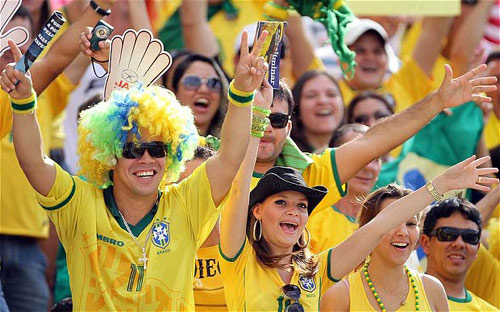
|
Brazilis known for its generous number of public holidays. There are nine national holidays every year, not an exceptionally large number. But it is supplemented by seven "optional" holidays granted at employers' discretion. Some of those apply to certain professions, such as Teachers' Day, Commerce Day and Civil Servants' Day in October. Then there are the state and municipal holidays. InRio de Janeiro, whose citizens are known for their laid-back approach to life, there are three local holidays: Saint Sebastian Day, Saint George Day and Black Consciousness Day. Other local holidays remember events such as the founding of towns, colonial massacres and a conflict known as the Ragamuffin War. The World Cup has brought the phenomenon to a whole new level. When FIFA demanded Brazil pass a wide-ranging "General Law of the Cup" regulating the organization of the tournament, Brazilian legislators used the occasion to add some more holidays in between provisions on trademark protection and special visas. The law, passed in 2012 and widely criticized as too generous to FIFA, provides for an afternoon off every day thatBrazilhas a match, as well as a holiday for host cities every time they host a game. Critics of the decision to spend a record $11 billion on the World Cup say the days off are just another way to hide the country's overburdened transport systems and infrastructure problems. Rio andBelo Horizontein the southeast have three extra days off, the western city ofCuiabaand the capitalBrasiliahave four,Sao Paulohas six. InSalvadorin the northeast, the combination of weekends, national holidays, local holidays and match days means people will only have to show up at work for four full days during the three-week period from June 12 to July 2. Many schools have also started their July vacations in June to let students take part in the World Cup party. |
眾所周知,巴西是足球的王國,巴西人民對足球的熱愛更是舉世聞名。據(jù)法國媒體6月15日報道,本屆世界杯期間,為了讓國民盡情觀賞賽事同時解決國內(nèi)交通擁堵難題,巴西政府專門通過立法增加了不少“世界杯專屬假日”。 巴西原本就是一個公共假日較多的國家。據(jù)統(tǒng)計,巴西每年有9個全國性法定節(jié)假日,7個由雇主自行決定的假日,例如商人節(jié)、教師節(jié)、公務(wù)員節(jié)等職業(yè)性節(jié)日。除此之外,巴西還有不少州級和市級節(jié)日,以“閑適之城”里約熱內(nèi)盧為例,當(dāng)?shù)鼐陀?個地方性節(jié)日。 而世界杯的到來,令巴西的節(jié)假日數(shù)量上升到一個全新的高度。 2012年,在國際足球聯(lián)盟(FIFA)的要求下,巴西通過一部《世界杯普通法》,在廣泛范圍內(nèi)協(xié)調(diào)賽事組織工作。借此機會,巴西議員們在商標(biāo)保護(hù)、發(fā)放特殊簽證等法律條款中增加一項新內(nèi)容——設(shè)定“世界杯專屬假日”。 按照規(guī)定,本屆世界杯期間,只要有巴西隊的比賽,當(dāng)天下午就放假,而各個主辦城市還可在該市比賽日放假。由此,里約熱內(nèi)盧和貝洛哈里桑塔的假期增加了3天,庫亞巴和巴西利亞的市民可以多休息4天,圣保羅則可以多放6天假。 巴西東北部城市薩爾瓦多是本屆世界杯的主辦城市之一。從6月12日到7月2日,算上周末、國家法定節(jié)假日、地方節(jié)假日以及“世界杯專屬假日”,薩爾瓦多的市民只需要上4個全天班。 世界杯的到來,也為巴西的學(xué)生們帶來福利。為了讓孩子們充分參與這項足球盛事,當(dāng)?shù)卦S多中小學(xué)將暑假時間提前。 (譯者 諶融 編輯 丹妮) 掃一掃,關(guān)注微博微信
  |
